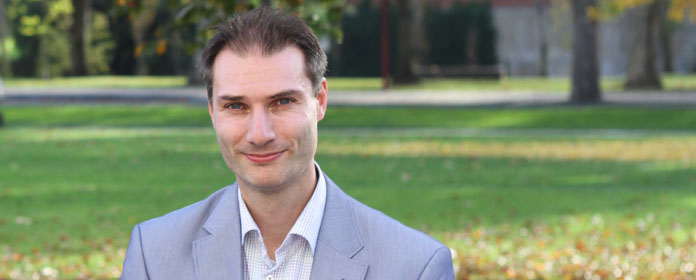2015_11_12_ICSentrevista
"If we learn how to strengthen collaborations among palliative professionals we can promote better care"
Jeroen Hasselaar is coordinator of the European project InSup-C, which involves the ICS ATLANTES Program and 10 other partners from Europe and the USA.

The project of research 'Integrated Palliative Care - Insup-C', funded by the European Union, was launched in 2013. It has 11 partners, one in the USA and ten in Europe, including the ATLANTES Program at Institute for Culture and Society of the University of Navarra.
Jeroen Hasselaar, coordinator of project, reviews in this interview some news and questions of interest about project on the occasion of the 2015 general assembly, which was held at the University of Navarra on November 9 and 10.
One of the main objectives of InSup-C is to achieve integrated palliative care. Why is this important?
When we talk about integrated palliative care, we mean that a person receives the right care, in the right place, by the right caregiver, at the right time. There are many definitions, but this is more or less the one that captures all the main points.
At InSup-C we are looking for different aspects of integration, but we focus mainly on the integration of palliative care in cancer treatments or chronic diseases.
Another level of integration makes reference letter how professional caregivers work together and establish collaborations with each other. In addition, different health care organizations also participate in this idea of integration.
What is the current status of palliative care in Europe?
We can say that palliative care in Europe is developing and many efforts are being made to this end. The European Palliative Care association now has 31 member countries and keeps all these European countries connected on the subject of palliative care. This association organizes congresses and other activities with the goal to put its members on contact to learn from each other, to present new ways of providing palliative care, to share research results... The celebration of this meeting here at the University of Navarra is a good example to illustrate that this subject of meetings is growing.
While interest is growing, so is the issue of people in need of palliative care; for example, there are more and more cases of cancer. Patients with chronic diseases or going through difficult stages of their illness need support to cope with symptoms and pain. Therefore, there is an increase in awareness and interest in palliative care but also in needs, and although there has been good progress, there is still a lot work to be done.
What are the most outstanding results obtained with project so far?
The project is not finished yet, so it is difficult to point out what are the most outstanding results. So far, I am proud of the fact that project is trying to combine research based on interviews with patients, with physicians, with caregivers... It is the most basic level, where everything happens.
Specifically, we have conducted the study in five countries - Belgium, Hungary, the Netherlands, Germany and England - with the aim of goal to see what we can learn from each other. With the interviews, we are trying to detect the main similarities and differences between countries in order to be able to make comparisons.
At Institute for Culture and Society we collaborated with Carlos Centeno to describe how to improve the integration of palliative care into health systems, which is also an important part of project.
What social impact can this subject of projects have?
What is important is that we are finally more aware that there is a need for palliative care and we are more aware of all that is necessary within the care that patients receive, as they involve oncologists, nurses... If we learn how these collaborations can be strengthened we will be able to promote better care. We hope that this project will contribute to improving the care of palliative patients.
To what extent can a project like this help advance palliative care around the world?
InSup-C is a European project , so we focus mainly on Europe, but we hope that it will also be useful for many other countries or people in need of palliative care.
At present, we are trying to develop an e-learning model to extend the results of the project and to make them available to all those who are interested. We also have in mind the publication of a book. Finally, I believe that with our partnership with WHO and association European Palliative Care we are also helping to improve development and the promotion of palliative care.

